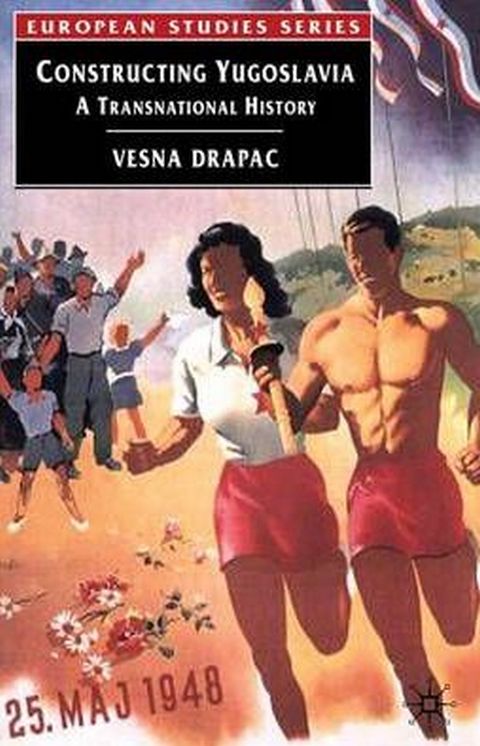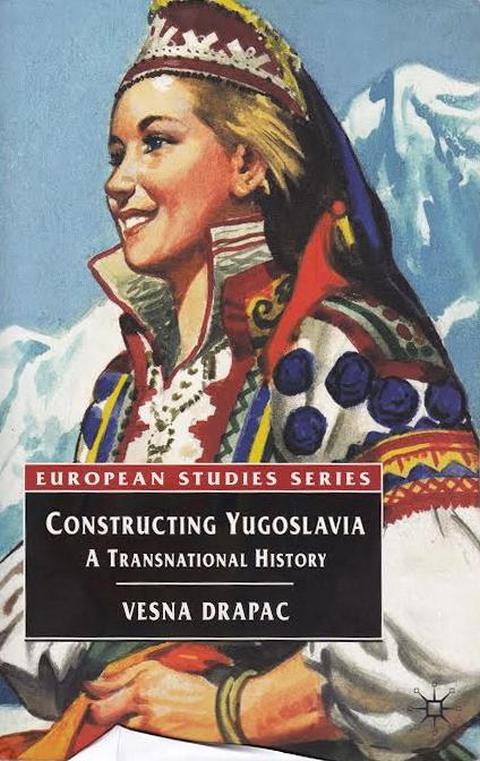Vesna Drapac: Deconstructing Yugoslavia - a Transnational History, a monograph reviewed by Dr. Mladen Ibler
http://www.croatia.org/crown/articles/10485/1/-Vesna-Drapac-Deconstructing-Yugoslavia---a-Transnational-History-a--monograph-reviewed-by-Dr-Mladen-Ibler.html
By Dr. Mladen Ibler
Published on 11/24/2013


 | Deconstructing Yugoslavia would be probably a more appropriate title of this book. The country failed twice as an integrated state – first as a Kingdom and next as a Communist state. Apart from the communist party and the army, which where the repressive organs of a corrupt and self-serving ruling elite after the Second World War, all cross-republican institutions fell well of atracting lasting interest. The idea of Yugoslavia died well before the state finally disapeared at the end of 20th century. The monograph has been written by Vesna Drapac, associate professor at the University of Adelaide, Australia. |
The book´s cover shows a (communist) fake, non-existing national costume

Soft-cover edition of the monograph by professor Vesna Drapač.

Hard-cover edition of the monograph by professor Vesna Drapač.
| CONSTRUCTING YUGOSLAVIA - A TRANSNATIONAL HISTORY Palgrave Macmillan 2010 Deconstructing Yugoslavia would be probably a more appropriate title of this book. The country failed twice as an integrated state – first as a Kingdom and next as a Communist state. Apart from the communist party and the army, which where the repressive organs of a corrupt and self-serving ruling elite after the Second World War, all cross-republican institutions fell well of atracting lasting interest. The idea of Yugoslavia died well before the state finally disapeared at the end of 20th century. Covering the period from 1850s to the death of Tito in 1980, professor of history at the University of Adelaide Vesna Drapac situates Yugoslavia in the broader international context and examines its history, within the more familiar story of Europe in the nineteenth and twentieth centuries. She went through 199 books, 26 articles from different journals and newspapers, 3 dissertations and consulted the papers of Robert William Seton–Watson in the London School of Slavonic and East European Studies by permission of his son Christopher. Most of 725 references cited in the book originate from the British and French sources. In some cases, authors were quite ignorant of the historic and geographic facts of the people and country they describe, seldom based on antropological and racist theories of that time. After the retreat of Ottoman Empire and political vacuum in the area, such descriptions passed well in the British-French foreign politics. It is noticeable from the correspondance between Seton–Watson and british ambassador in Belgrade Nevile Henderson (1882-1942) as well from his dispute with Edith (Mary) Durham. With analytical aproach, in 335 pages with introduction and conclusion professor Vesna Drapac´s book contains five chapters :
The book´s cover shows a fake, non-existing national costume. In conclusion, author emphasizes that Yugo-nostalgia is an innapropriate vehicle for studying the history and demise of the Yugoslav ideal. Illusion of a new, similar hybrid construction is also dangerous. It is ahistorical and romanticizes an imagined past, creates new myths, perpetuates and recasts old ones and inhibits an open engagement with conflicting historical narratives. The book is a reading recomended to historians, politicians and others interested in Balkans and south-eastern Europe. MLADEN IBLER |
| Vesna Drapac  Vesna Drapac is Associate Professor of History at the University of Adelaide. She is an Australian of Croatian background. She was born in Adelaide and educated at Mary MacKillop College, the University of Adelaide and Oxford University where she attended New College as a Rhodes Scholar. She is married and has two sons aged 19 and 17. Vesna Drapac is Associate Professor of History at the University of Adelaide. She is an Australian of Croatian background. She was born in Adelaide and educated at Mary MacKillop College, the University of Adelaide and Oxford University where she attended New College as a Rhodes Scholar. She is married and has two sons aged 19 and 17.Drapac has had extensive experience working with immigrant community organisations in South Australia and nationally. She has a detailed knowledge of the history of one of the largest groups arriving in the two waves of mass immigration to Australia after the Second World War and a general interest in patterns of migration and settlement especially within South Australia. She is on the board of the Croatian Studies Review produced jointly by Macquarie University and the Universities of Split and Zagreb (Croatia). She was Deputy Chair of the Croatian Community Council for 10 years and has been a delegate of the Croatian Community to the Board of Ethnic Broadcasters Inc (5EBI). She has managed community projects funded under the Multicultural Grants Scheme including the Plaque Project which coordinated activities involving the Croatian Ethnic School Adelaide, refugee artists from Bosnia and Herzegovina, and the Migration Museum, as well as various Fringe activities and the production of two brochures: ‘Croatians in South Australia’ (2004) and ‘The Croatian Ethnic School Adelaide, 1966-2006’ (2006). She has chaired a conference held by the South Australian Multicultural Arts Centre, Nexus, and participated in conferences on Croatian immigration held in South Australia and New South Wales. Her contribution to the second edition of the most comprehensive Australian publication on the history of immigration, patterns of settlement and community engagement, The Australian People: An Encyclopedia of the Nation, Its People, and Their Origins edited by James Jupp (2001) comprises an article of approximately 5,000 words on the history of Croatian immigration and Croatian associational life in Australia since 1945. Currently she is working on a project investigating the impact of the Second World War on Yugoslav immigrant communities in Australia. Drapac’s community work has involved liaising between ethnic community representatives, local artists, government sponsored community workers, various government agencies and politicians. She is particularly interested in multicultural practice in the arts, in education, in cultural institutions and in broadcasting. Source www.multicultural.sa.gov.au |
| Associate Professor Vesna Drapac vesna.drapac@adelaide.edu.au The University of Adelaide Vesna Drapac was born in Adelaide and holds degrees from the Universities of Adelaide (BA and BA Hons) and Oxford (D.Phil). On her return from Oxford, where she studied at New College as a Rhodes Scholar, she was Tutor in History at the Flinders University of South Australia. She has been teaching at the University of Adelaide since 1992. Teaching Interests Vesna was awarded the Executive Dean’s Prize for Excellence in Teaching in 2006. Her undergraduate teaching is largely in the area of modern European history and she convenes the following upper level courses:
Vesna teaches an Honours course on resistance and collaboration in Hitler's Europe and she supervises students at honours and postgraduate levels writing theses on a wide range of topics. PhD completions under her supervision include:
Research Interests Vesna’s research interests are primarily in the area of modern European history, with particular focus on the social and cultural impact of war in the twentieth century; the historiography of resistance and collaboration in Hitler’s Europe; representations of women at war; film and history; and Catholic devotional life and practice. Several of these interests converge in her recent book, Constructing Yugoslavia: A Transnational History, which was published in 2010. The book broadly covers the period from the late 1850s to the death of Tito in 1980 and provides a novel perspective on the idea of Yugoslavia through its various permutations. She is currently working on a number of projects: the early films of Robert Bresson; the Yugoslav Partisans in history and memory; the historiography of the Second World War in Europe in a comparative context; and the international appeal of Therese of Lisieux in the mid-twentieth century. Vesna’s secondary research interest is the history of twentieth-century Australian immigration in the context of identity politics, multiculturalism and citizenship. A selection of her publications is listed below. Publications Sole-authored books
Edited works Volume 2 of the e-journal French History and Civilization Vol. 2 (2009) with André Lambelet. This journal is published by H-France and Volume 2 brings together articles based on papers presented at the 15th George Rudé Seminar in French History and Civilisation held at the University of Adelaide in July 2006. Book Chapters ‘Yugoslav Studies and the East-West Dichotomy’ in The East-West Discourse: Symbolic Geography and its Consequences, edited by Alexander Maxwell (Peter Lang: Oxford and Bern, 2011), pp. 93-125. (Volume 8 in the series Nationalisms Across the Globe.) Refereed articles
Community Engagement Community History Projects
Source www.adelaide.edu.au |
Dr. Mladen Ibler, Denmark, is former Croatian diplomat and ambassador in several countries.
In the name of the readers of the CROWN we express our gratitude for this article.
Also, we can recommend You several other very interesting articles by Dr. Mladen Ibler:
In the name of the readers of the CROWN we express our gratitude for this article.
Also, we can recommend You several other very interesting articles by Dr. Mladen Ibler:
COUNT IVAN ANŽ FRANKOPAN, THE ROYAL STEWARD OF THE ESTATE IN SWEDEN 1426 - 1434
Zdenka Sertić, akademska slikarica i etnografkinja
Hrvatski grb iz Frankopanskog Senja u Švedskoj?
Dvije tisuće slika ukrašavat će budući svjetski centar (o hrvatskom slikaru Kristianu Krekoviću);
sa švedskoga na hrvatski preveo dr. Mladen Ibler
Hrvatski grb iz Frankopanskog Senja u Švedskoj?
Dvije tisuće slika ukrašavat će budući svjetski centar (o hrvatskom slikaru Kristianu Krekoviću);
sa švedskoga na hrvatski preveo dr. Mladen Ibler
Formated for CROWN by Darko Žubrinić
Distributed by www.Croatia.org . This message is intended for Croatian Associations/Institutions and their Friends in Croatia and in the World. The opinions/articles expressed on this list do not reflect personal opinions of the moderator. If the reader of this message is not the intended recipient, please delete or destroy all copies of this communication and please, let us know!